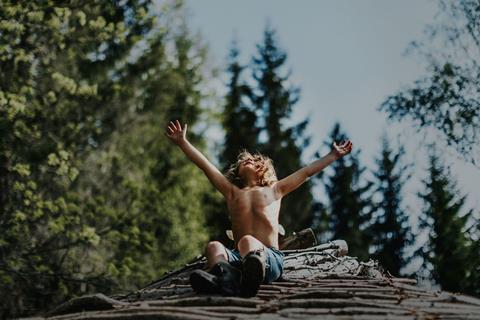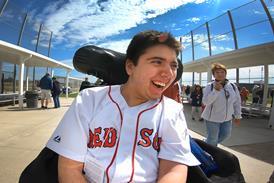An family living off-grid suffers a devastating loss in this gentle Norwegian documentary

Dir: Silje Evensmo Jacobsen. Norway. 2024. 84mins
Paradise is shattered by tragedy in this documentary about an Norwegian family struggling after the loss of its matriarch. Director Silje Evensmo Jacobsen creates a gentle, intimate portrait of the Paynes, who live alone in the forest in order to enjoy a freer existence. But that idyllic arrangement unravels in the wake of grief and this bittersweet film offers no pat happy endings, recognising the enormity of what the mother’s death means to this close-knit group.
Never tries to force drama onto the proceedings
A New Kind Of Wilderness premieres in Sundance’s World Cinema Documentary Competition. Jacobsen’s previous film, Faith Can Move Mountains, screened at Thessaloniki Documentary Festival in 2021, and her follow-up should resonate with mainstream viewers — especially those who have experienced the passing of a beloved parent. Such an understated picture may not see major theatrical play, but it could be an attractive streaming option.
Deciding to go off the grid, photographer and nature-lover Maria and her husband Nik Payne moved to the wilderness to raise their four children on a farm. Home movies illustrate the happy life they led, but Maria’s death from cancer at the age of 41 forces Nik to consider returning to society, recognising that it would simply be too hard remaining in the forest as a single parent.
Jacobsen depicts the Paynes as openhearted, loving individuals. Some viewers might assume, because they lived off the land in the middle of nowhere, that Maria and Nik were radical anti-conformists, but there is nothing extreme about this family, all of whom relished this simpler life surrounded by animals and growing their own food. Audience assumptions are upended again during the family’s uneasy re-entry into civilisation, such as when the younger children go to school rather than being tutored at home. A New Kind Of Wilderness eschews fish-out-of-water cliches — indeed, what is hardest for the Paynes to adjust to is a world without Maria.
The documentary never tries to force drama onto the proceedings. The closest it gets to conflict is when oldest Payne child Ronja — who was Maria’s daughter from a previous relationship — elects to move in with her father after Maria’s death, leaving Nik to raise the three younger siblings. But this new living arrangement mostly produces melancholy, with Ronja coping with her guilt about leaving and her siblings trying to stay connected to their older sister. Jacobsen avoids traditional talking-head interviews, preferring to let the participants’ thoughts weave through the film as voiceover, which makes their insights feel more confessional and vulnerable; a secret shared with the audience. There are no villains here, only sympathetic individuals navigating their sorrow.
That said, the lack of tension — or much in the way of narrative — can give the documentary a sense of small stakes. While Maria’s death, which is presented early on in the slight 84-minute run time, is crushing for the family, the participants are not so inherently fascinating or complex that their grief results in gripping cinema. But it is to Jacobsen’s credit that she highlights how apparently minor decisions can suddenly feel weighty.
Nik ponders bringing the family to England, where he grew up, but he wonders if that would be a betrayal of Maria’s wishes for how to raise their children. Such an inherently emotional story could easily tip over into the maudlin, but the film’s overriding modesty creates a wistful tone, as Nik contemplates what is best for himself and his children in the aftermath of the unthinkable.
In keeping with its honest, no-frills approach, A New Kind Of Wilderness does not build to a grand climax or shattering epiphanies. Life simply moves on, and the Paynes adjust to a new reality, their broken hearts slowly mending. The moments we see of Maria in footage she herself shot hints at the lovely spirit she must have been. But nature, which Maria adored, has a way of healing itself, so it is apt that this documentary chronicles that same cycle of renewal and growth in the people she loved.
Production company: A5 Film
International sales: DR Sales, KIMC@dr.dk
Producers: Mari Bakke Riise, Silje Evensmo Jacobsen
Cinematography: Silje Evensmo Jacobsen, Karine Fosser, Fred Arne Wergeland, Espen Gjermundrod, Line K. Lyngstadaas, Natalja Safronova
Editing: Kristian Tveit, Christoffer Heie
Music: Olav Oyehaug
























